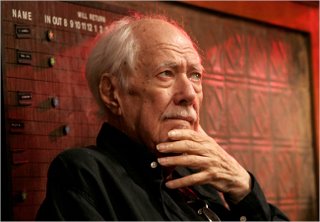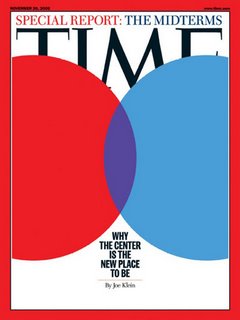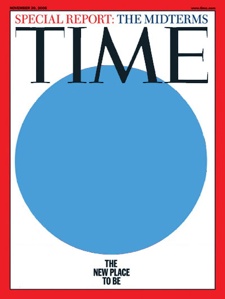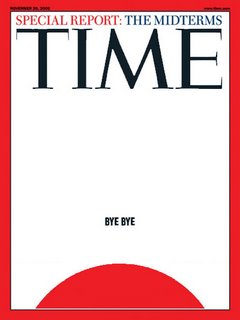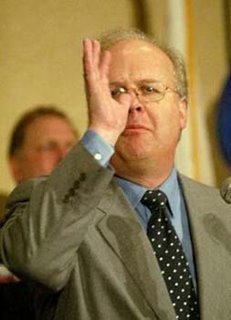This is part 2 of a five part look at the 2006 midterm elections and what it means for the Democratic Party. Read part 1 by clicking here.The Battle for Power
Competing wings of The Democratic Party are battling over what this election means.



(Image credits: progressivedemocrats.org, dlc.org, bluedog.org)
When the GOP fell victim to the Great Blue Wave of 2006, some liberals seemed convinced that now that the Democrats had won big, the struggle for power was decided, at least until the 08 election comes closer.
Wrong.
The 2006 midterm has greatly changed where American power is held in Washington. And Democrats, organizations and individuals alike, know that there prominence will largely be decided on how the spin they results of this election to show a mandate for what they believe in -- be it economic populism, centrist policies, leaving Iraq or ending corruption.
Some say this election was a clear victory for conservative Democrats, such as the Blue Dogs, and New Democrats; others say it was the a victory for the more liberal wing of the party, such as the Progressive Democrats of America, the Netroots and Moveon.org.
While it is a bit of an oversimplification, there has been two main narratives to speak of in regards to this issue.
1) This election is a victory for moderates.
Advocates of this position point to the fact that many of the new Democrats headed to Congress are not very left-wing.
This was especially notable in the Senate.
Some examples: Harold Ford a pro-life, immigration hard-liner, conservative Democrat nearly wins a seat in the South. Bob Casey, a social conservative, beats Santorum for a victory in Pennsylvania; Jim Webb, a former Republican who worked for Reagan, beat George Allen in Virginia; and the crew-cut sporting Tester, won by representing the image of a conservative populist that likes to be photographed in a tractor.
Al From*, founder of the DLC,
wrote:
"But give Democrats credit. Apart from a foolish summer fling with Ned Lamont and a late Laugh-In cameo from John Kerry, Democrats did just about everything right and ran their best campaign in a decade. Field marshals Rahm Emanuel and Chuck Schumer ignored the virtual industry of self-help nonsense that has paralyzed Democrats' chattering classes and went back to a simple, proven formula: From the suburbs to the heartland, elections are won in the center."
The Bull Moose blog, also an advocate for the conservative DLC, said the victory was as much a condemnation of the left as it was the right:
"The Moose celebrates the rise of the middle.
Across the board, the election has been correctly interpreted as the revenge of the center. The immoderate moderates smote the elephants because they have displayed incompetent incompetence and acted as dividers and not uniters. After the red-state blue-state divide, this year the voters were in a furious state.
Both parties are on probation with the electorate."
*(The DLC is notoriously pro-war, which may be why he called the election a victory of the "Vital Center" and not a public vote against staying in Iraq. In fact, he didn't mention Iraq as a factor in the election, which is as curious as it is ridiculous. One of the co-founders of the DLC, Will Marshall, was one of many co-signers of the now infamous PNAC letters urging unilateral policies, using the military to further US hegemony and preemptive war.)
2) This election is a victory for progressives.
Those who argue that this is a victory for progressives aren't buying the above claims.
Nick Burt and Joel Bleifus of In These Times, counter: "Don’t buy all the crap coming from GOP talking-point memos or the blather from mainstream pundits. The midterm elections do not signal a move to the center. Yes, a few conservative Democrats were elected, but the big gainers were progressives. In particular, the Congressional Progressive Caucus is on the rise."
John Nichols of The Nation made a similar point: "The largest ideological caucus in the new House Democratic majority will be the Congressional Progressive Caucus, with a membership that includes New York's Charles Rangel, Michigan's John Conyers, Massachusetts' Barney Frank and at least half the incoming chairs of House standing committees. "
And what may be more persuasive is the fact that conservatives are leaning on the idea that the public wants conservative Democrats to protect us from the crazy lefties. Fox News has been singing that tune since the election. And Newt Gingrich suggests in The Wall Street Journal, that conditions in Congress are such that Bush needn't even negotiate with Pelosi, Obama, and other more liberal Democrats, but instead only engage with bipartisan talks with the Blue Dogs.

He writes: "A conservative populist grassroots strategy would almost certainly make daily interactions with liberal leaders more confrontational as they found themselves nominally chairing committees but losing votes on the floor and having their initiatives rejected by a conservative grassroots coalition. With a conservative populist grassroots strategy it is the 44 Blue Dog Democrats who would find themselves cross-pressured."
A win for moderation -- but not moderates.
My humble take on this election is that this is a victory for moderation, but not for moderates. Progressives are more responsible for this victory than conservative Democrats, but a progressive Congress will not serve to make this country a left-wing government.
After six years of Bush, eight years of Clinton ( a DLC Democrat) and 12 years of Republican leadership before that, our country has radically shifted its policies to the right.
The media is deregulated heavily, big-business has more clout than ever; welfare has been cut; bankruptcy laws have been cut; social services have been cut; wages are stagnant despite economic growth; the richest Americans are getting richer while the rest of the country lags behind; the middle-class has suffered; unions have been marginalized; civil rights have been trampled on; dissenters patriotism is questioned; the world hates us more than ever' the military budget has soared; the minimum wage has been idle despite the rise in inflation; gay marriage has been used as a political tool for the far right; global warming has been ignored; science is marginalized in classrooms; the executive branch has unprecedented sweeping powers; our government has spied on our phone calls, and e-mails; peace activists have been spied on; journalists have been paid off here and overseas; and the Wolfowitz Doctrine (often called the Bush Doctrine) has become our foreign policy.
A progressive Congress could not implement radical leftist policies even if it wanted to do such a thing. What they can do, however, if they are strong and refuse to concede too much, is to fix some of these terrible problems by pursuing progressive legislation. The rights takeover of Washington was perpetuated by conservative Democrats, and if the DLC types were to have their way, they would keep progressives from bringing us back to a point of moderation by dismantling some of these horrific conservative policies. But the damage is far too bad to think we can triangulate our way back to moderation. We need a progressive Congress to bring us back to the moderation -- and then we can worry about triangulating.
My conclusion -- that this is a victory for progressives insomuch that are best suited to moderate our government from the iron grip that the far right has had on it. And that this is why the country has voted for progressive reform is based on two main points. 1) That progressives galvanized the anti-war sentiment which was the main factor in the Democratic victories on election day and 2) that many of the so-called conservative Democrats -- such as Sherrod Brown of Ohio and Jon Tester of Montana -- are actually economic populists, far more liberal than the perception dictates
Progressives, the public and Iraq
In recent years, while so-called moderate Democrats were voting for the War in Iraq, the Patriot Act (and in some cases, even abhorrent Military Commissions Act), and constantly beating the drum for prolonging the war, many progressives of this country were pointing out the flawed evidence used by Bush and co., the impending difficulty of post-war Iraq, the failure of the media to scrutinize the situation fairly and the inherently dangerous precedent of invading countries who never attacked us.
While Washington insiders, including some Democrats, often scoffed at these types, labeling them as "fringe lefties," who "blame America first."
As reality caught up to the American people, however, (The leaked NIE, The Downing Street Memo, the increasing bloodshed, the extended tours for soldiers, the growing discontent from the military, books by Ricks, Woodward and so on) Democrats realized that the only way to win was to run on Iraq.
For some time it was only true blue progressives, such as Russ Feingold, who were not flinching in their opposition to the war.
Then came Jack Murtha. His military credentials and his relative conservative viewpoints helped him to legitimize unambiguous support for ending the war. Then came the shocking primary in early August in which Ned Lamont did something that historically never happens -- beat an incumbent Senator in a primary. These two Democrats really changed the direction of the 2006 campaign. Polls showed Iraq was the number one issues for voters, and Murtha and Lamont helped to framed the debate.

Conservative Democrats (who are often mislabeled as moderates) could not have won this election without the anti-war left. The reason is simple: They were not with the public on Iraq. The public opposes this war and regrets waging it. And their distaste for Iraq policies are not merely a condemnation of Bush and Rumsfeld, but a condemnation of the policies they implemented. Democrats who support(ed) these policies would be wise to understand that.
Progressives and populism
It is true that some of the new Democrats in congress are conservative on some issues especially on immigration and abortion.
But on economic issues the bulk of them, including Brown, Webb, Casey and Tester, are actually quite liberal on economic issues. Consider what Webb told NPR the day after Allen conceded the election: "I decided to run because of my concern...with the economic breakdown that's happened in this country along class lines."
You heard that right: class lines.
"There are huge income inequalities...that we haven't seen since the 1880s,” he said. "And wages and salaries...are at an all-time low as a percentage of wealth."
And economic issues were very important to voters in 2006, as
Nichols notes:
“As idiosyncratic as he is, Webb is not an anomaly. He's part of a broader trend that has been obscured by the fast-congealing conventional wisdom that the election results were driven chiefly by the ongoing disaster in Iraq. If you drill down a little into those results, it's clear that Iraq and Republican scandal can't account for all the Democratic victory. Consider the Democrats' success at the state level. The party picked up six governors, nine legislative chambers and more than 300 state legislative seats, none of which can plausibly be ascribed to discontent over Iraq."That some candidates ran somewhat conservatively in conservative states does not underscore how the success of progressives around the country. As
Tad Daley noted:
“The three most progressive major U.S. Senate candidates in the country each won going away. On a day of record turnouts nationwide, Sherrod Brown garnered 56% of the vote in Ohio, Amy Klobuchar secured 58% in Minnesota, and Bernie Sanders (actually not a Democrat but a socialist!) pulled a full 65% in Vermont.
None of these three candidates apologized for their unabashedly progressive principles. None of them pandered to people who voted Republican in the last election to convince them to come over to the other side. Instead, all of them fired up the Democratic base, put forth big uncompromising liberal ideas, and inspired thousands of citizens who otherwise might not have cast a ballot to show up on Tuesday at the polls.
Coming soon
Part 3: Howard Dean v. Rahm Emanuel: The logic of the 50-state strategy







